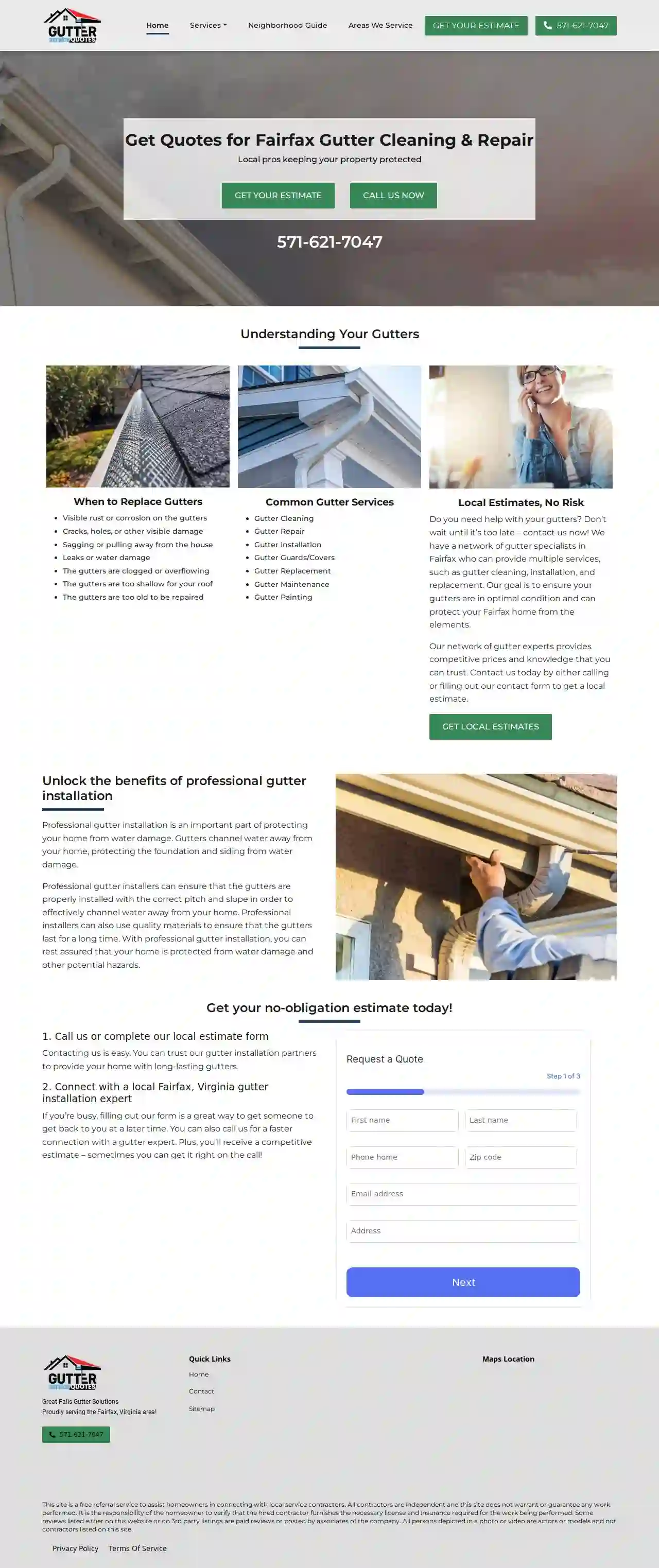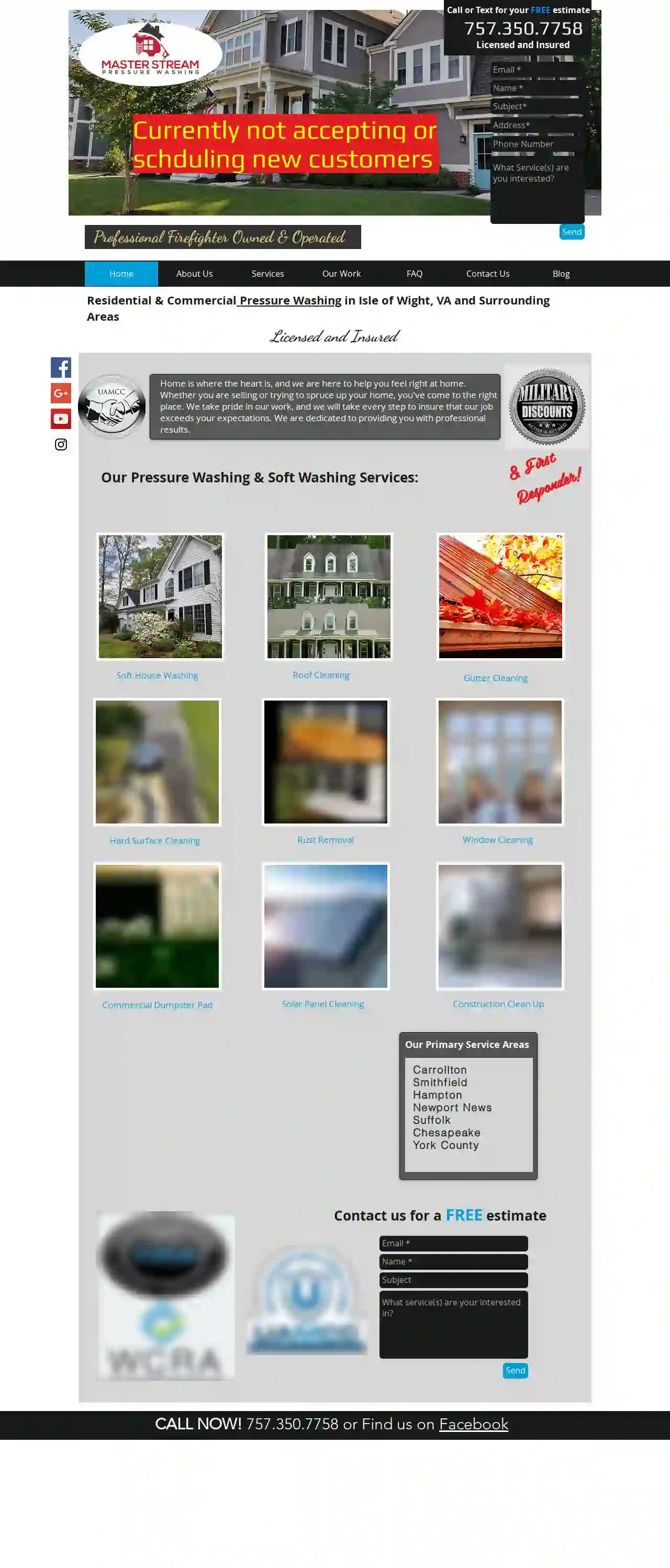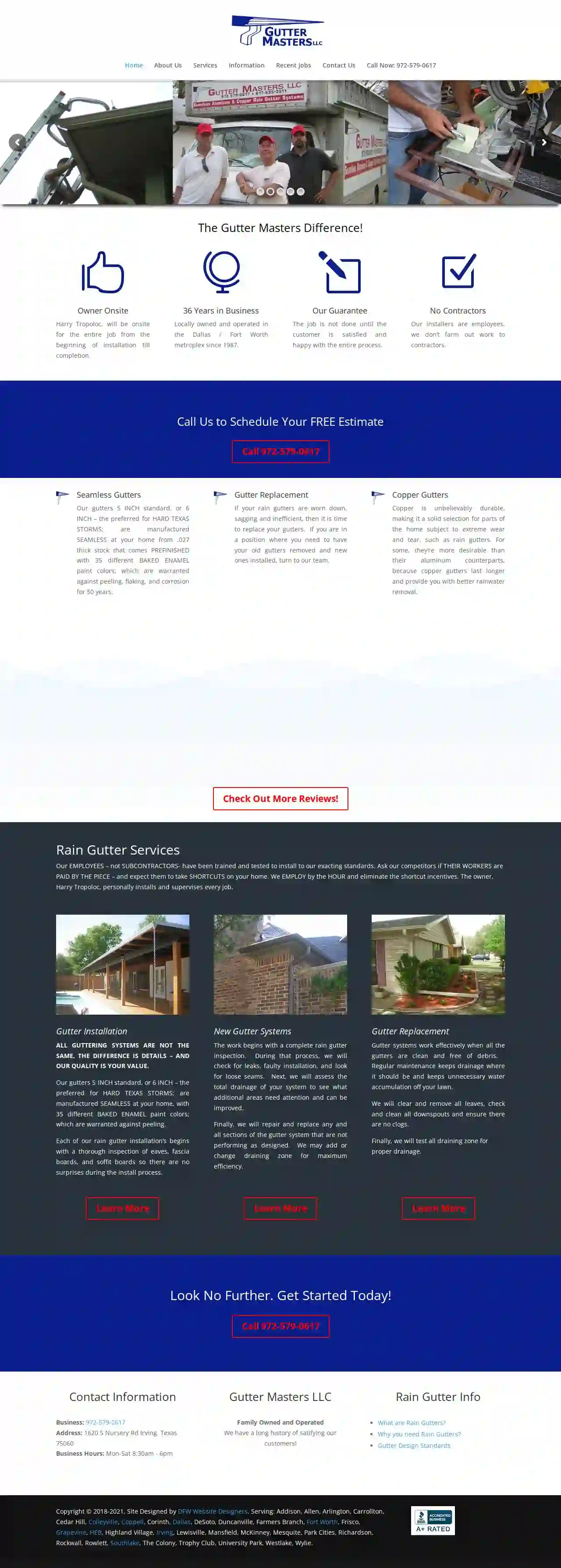Gutter Cleaning Fairfax
Find the best Gutter Cleaning in Fairfax
Get 3 FREE Gutter Cleaning quotes for your project today! Compare profiles, reviews, accreditations, portfolio, etc... and choose the best offer.

Great Falls Gutter Solutions
59 reviewsFairfax, USGreat Falls Gutter Solutions is a local gutter installation company serving the Fairfax, Virginia area. We provide a range of services, including gutter cleaning, installation, and replacement. Our goal is to ensure your gutters are in optimal condition and can protect your home from the elements. Our network of gutter experts provides competitive prices and knowledge that you can trust. Contact us today by calling or filling out our contact form to get a local estimate.
- Services
- Why Us?
- Gallery
Get Quote
Git 'R Dun Pressure Wash
511 reviews1000 Jefferson Ave, Suite 100, Newport News, 23606, USGit 'R Dun Pressure Wash is a locally owned and operated pressure washing service provider based in Newport News, VA. They proudly serve the surrounding communities, including Chesapeake, Essex County, Gloucester County, Hampton, Isle of Wight County, James City County, Middlesex County, Newport News, Norfolk, Portsmouth, Suffolk, Virginia Beach, Williamsburg, York County, and Yorktown. The company specializes in providing professional, thorough service and customer satisfaction. Their team of knowledgeable crew members offers a wide range of services, from pressure washing and soft washing to gutter cleaning, repair, and installation. They also provide junk removal services. Git 'R Dun Pressure Wash is fully licensed and insured, and they guarantee detail-oriented and thorough cleaning procedures. They are committed to exceeding customer expectations and offer competitive prices.
- Services
- Why Us?
- Our Team
- Testimonials
- Gallery
Get Quote
ProGutters
4.956 reviewsRoanoke, VA, USProGutters is a locally owned and operated business in Roanoke, Virginia. We've been in the industry for years and we started this company because in our industry there is a poor lack of customer appreciation and value. The expensive prices being charged for gutter services and the poor work being performed did not match. We're here to change that experience. We provide five-star services that are affordable and fit your budget. Our services include gutter cleaning services, gutter cover and gutter guard installations, downspout installations, seamless gutters, gutter repairs and all other gutter services.
- Services
- Why Us?
- Testimonials
- Gallery
Get Quote
Great Water Gutter Solutions
Chesapeake, USGreat Water Gutter Solutions is a company that connects homeowners and businesses in Chesapeake, Virginia with skilled and experienced gutter cleaning and installation professionals. We understand the importance of a properly functioning gutter system for protecting your property from water damage. Our network of contractors stays up-to-date on the latest gutter cleaning techniques and materials to ensure quality service. We offer a range of services, including gutter cleaning, installation, repair, and inspection, for both residential and commercial properties. We also offer a variety of gutter types and materials to choose from, so you can find the perfect solution for your needs and budget.
- Services
- Why Us?
- Gallery
Get Quote
Master Stream Pressure Washing & Roof Cleaning
537 reviewsIsle of Wight, USHome is where the heart is, and we are here to help you feel right at home. Whether you are selling or trying to spruce up your home, you've come to the right place. We take pride in our work, and we will take every step to insure that our job exceeds your expectations. We are dedicated to providing you with professional results.
- Services
- Why Us?
- Gallery
Get Quote
Premier Gutter Protection
525 reviewsLong Island, USWelcome to Premier Gutter Protection, your reliable partner for expert gutter installation and repair services on Long Island. Our team of expert gutter installers is ready to serve and protect your property today! With lightning-fast response times, exceptional service, and delivered by our team of seasoned experts in gutter services and rain gutters, we pride ourselves on providing lasting solutions at competitive rates. Experience our unmatched service in Long Island today for a free estimate on new gutters, gutter cleaning, and more.
- Services
- Why Us?
- Accreditations
- Our Team
- Testimonials
- Gallery
Get Quote
The Brothers that just do Gutters
4.3101 reviews809 Professional Place West, B102, Virginia Beach, 23323, USThe Brothers that just do Gutters is a family-owned and operated gutter contractor serving Virginia Beach, VA and surrounding areas. We are committed to providing our clients with a 5-star experience that goes beyond traditional service. We prioritize both our clients and employees, recognizing the significance of investing in their well-being. We uphold values of honesty, integrity, and transparency, and proudly share every review – positive or negative – to maintain accountability and learn as service professionals. This dedication has cultivated a community of loyal clients who have become not just customers but friends and neighbors, fostering a sense of trust within the neighborhoods we serve. We understand the unique elements of your home’s roofline, pitch, overhang, fascia, and valleys are crucial when considering gutter installations. Our Solutionists© specialize in evaluating your home and devising a tailored plan for gutter replacement or seamless installation. We leverage cutting-edge technology and employ industry-leading materials to craft a custom gutter system that perfectly aligns with your home’s needs. Recognizing the potential damage water can inflict on your home’s structure, foundation, and property over time, we emphasize a comprehensive approach to gutter services. Beyond installations, we offer a full spectrum of related gutter contractor services, including repairs, cleaning, and maintenance, ensuring your home remains safeguarded from the harmful effects of water accumulation. Choose The Brothers that just do Gutters for a seamless blend of expertise, technology, and client-focused values, providing unparalleled protection for your home.
- Services
- Why Us?
- Gallery
Get Quote
Respros Roofing, Siding and Gutters
4.866 reviews2589 Quality Ct STE 320, Virginia Beach, 23454, USResPros Roofing Siding & Gutters Construction Company offers Affordable Seamless Rain Gutters in sizes that range from 5" to 7". We provide CUSTOM FABRICATION TO MATCH EXACT SPECIFICATIONS, AVAILABLE IN ALUMINUM & COPPER, AVAILABLE TO MATCH ANY COLOR PALLET, CAPACITY AVAILABLE FOR BOTH RESIDENTIAL & COMMERCIAL INSTALLATION, SECURED WITH HIDDEN HANGER & SCREW THAT CREATES A WATER TIGHT SEAL. Our ALUMINUM DOWNSPOUTS are available in multiple sizes, CUSTOM FABRICATION TO MATCH EXACT SPECIFICATIONS, AVAILABLE IN ALUMINUM & COPPER, AVAILABLE TO MATCH ANY COLOR PALLET, AVAILABLE IN VARIES SIZES AND FINSHES, CAPACITY AVAILABLE FOR BOTH RESIDENTIAL & COMMERCIAL INSTALLATION. We also offer Gutter Cleaning Service, Rain Gutter and Seamless Gutter Repairs, and Leaf Guard Installations.
- Services
- Why Us?
- Gallery
Get Quote
The Brothers that just do Gutters
520 reviewsFairfax, VA, 22030, USAt our core, we are a gutter contractor deeply rooted in community values, placing our clients at the center of everything we do. We value our employees and invest in their growth, understanding that their expertise and dedication contribute to delivering a stellar experience for our clients. Honesty, integrity, and transparency are the guiding principles that shape our approach. We embrace all reviews, be they positive or negative, as we believe in complete openness. This commitment not only keeps us accountable but also serves as a valuable learning tool to continuously improve our services. Through our unwavering dedication, we have fostered enduring relationships with numerous clients who have become more than just customers – they have become our friends and neighbors, some of whom you may already know! As a community-minded business, our focus extends beyond mere transactions. Our dedication to providing a 5-star experience stems from our belief that exceptional service should be the norm. We understand that by prioritizing integrity and transparency, we earn the trust and loyalty of our clients. Our commitment to sharing all reviews demonstrates our genuine desire for improvement, ensuring that we constantly refine our skills as service professionals. This unwavering commitment has not only allowed us to cultivate a loyal customer base but has also facilitated meaningful connections with our clients, who often reside in the same neighborhoods as you. When you choose us, you not only choose a gutter contractor, but you also gain a team of professionals dedicated to delivering excellence while building a close-knit community of satisfied homeowners.
- Services
- Why Us?
- Gallery
Get Quote
Gutter Masters, LLC
4.816 reviews1620 S Nursery Rd, Irving, 75060, USThe Gutter Masters Difference! Harry Tropoloc, owner of Gutter Masters, is committed to providing exceptional service to every customer. With 36 years of experience serving the Dallas/Fort Worth metroplex, Gutter Masters is a locally owned and operated business that takes pride in its work. Harry personally oversees every job, ensuring that it is completed to the highest standards. Gutter Masters stands out from the competition by employing its own installers, not subcontractors. This means that customers can be confident that their gutters will be installed by experienced professionals who are paid by the hour, eliminating any incentive to take shortcuts. The company offers a variety of gutter services, including seamless gutter installation, copper gutter installation, and gutter replacement. Gutter Masters also provides free estimates and guarantees customer satisfaction.
- Services
- Why Us?
- Our Team
- Testimonials
- Gallery
Get Quote
Over 60,241+ Cleaning Businesses on our directory
Our janitorial pros operate in Fairfax & surrounding areas!
CleaningMatch has curated and vetted Top Janitorial Contractors in Fairfax. Find a reliable business today.
Frequently Asked Questions About Gutter Cleaning
- Prevent Ice Dams: Clogged gutters can contribute to the formation of ice dams in the winter, which can trap heat inside your attic, leading to higher energy bills.
- Protect Insulation: Overflowing gutters can cause water to seep into your attic, damaging insulation and reducing its effectiveness.
- Prevent Mold Growth: Clogged gutters can lead to moisture buildup, creating a favorable environment for mold growth, which can affect indoor air quality and require energy-intensive remediation.
- Small House: Cleaning gutters on a small, single-story house may take 1-2 hours.
- Large or Multi-Story House: Cleaning gutters on a larger or multi-story house can take 3-4 hours or more.
- Reduced Leaks: Seamless gutters have fewer seams, reducing the likelihood of leaks developing over time.
- Improved Appearance: Seamless gutters create a more aesthetically pleasing and streamlined look along your roofline.
- Less Maintenance: Fewer seams mean less opportunity for debris to accumulate, reducing the frequency of cleaning needed.
Can gutter cleaning improve my home's energy efficiency?
By preventing these issues, gutter cleaning indirectly supports energy efficiency in your home.
How long does it take to clean gutters?
Additional services like gutter repair or gutter guard installation will add to the overall time required.
Do I need to be home for gutter cleaning?
However, it's a good idea to inform the company if you won't be home and provide any necessary instructions, such as gate codes or where to leave the debris bags. You may also want to be present for an initial assessment or walk-through to discuss your specific needs and any areas of concern.
What are seamless gutters, and are they better than sectional gutters?
Advantages of Seamless Gutters:
While seamless gutters offer advantages, sectional gutters are typically more affordable and easier to repair if a section becomes damaged. The best choice for your home depends on your budget, aesthetic preferences, and the length and complexity of your roofline.
Can gutter cleaning improve my home's energy efficiency?
- Prevent Ice Dams: Clogged gutters can contribute to the formation of ice dams in the winter, which can trap heat inside your attic, leading to higher energy bills.
- Protect Insulation: Overflowing gutters can cause water to seep into your attic, damaging insulation and reducing its effectiveness.
- Prevent Mold Growth: Clogged gutters can lead to moisture buildup, creating a favorable environment for mold growth, which can affect indoor air quality and require energy-intensive remediation.
By preventing these issues, gutter cleaning indirectly supports energy efficiency in your home.
How long does it take to clean gutters?
- Small House: Cleaning gutters on a small, single-story house may take 1-2 hours.
- Large or Multi-Story House: Cleaning gutters on a larger or multi-story house can take 3-4 hours or more.
Additional services like gutter repair or gutter guard installation will add to the overall time required.
Do I need to be home for gutter cleaning?
However, it's a good idea to inform the company if you won't be home and provide any necessary instructions, such as gate codes or where to leave the debris bags. You may also want to be present for an initial assessment or walk-through to discuss your specific needs and any areas of concern.
What are seamless gutters, and are they better than sectional gutters?
Advantages of Seamless Gutters:
- Reduced Leaks: Seamless gutters have fewer seams, reducing the likelihood of leaks developing over time.
- Improved Appearance: Seamless gutters create a more aesthetically pleasing and streamlined look along your roofline.
- Less Maintenance: Fewer seams mean less opportunity for debris to accumulate, reducing the frequency of cleaning needed.
While seamless gutters offer advantages, sectional gutters are typically more affordable and easier to repair if a section becomes damaged. The best choice for your home depends on your budget, aesthetic preferences, and the length and complexity of your roofline.